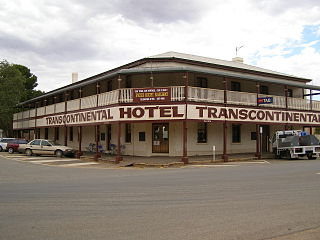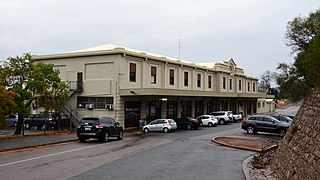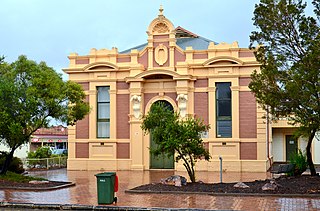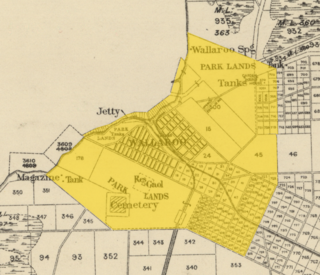
Whyalla was founded as "Hummocks Hill", and was known by that name until 1916. It is the fourth most populous city in the Australian state of South Australia after Adelaide, Mount Gambier and Gawler and along with Port Pirie and Port Augusta is one of the three towns to make up the Iron Triangle. As of June 2018, Whyalla had an urban population of 21,742, having declined at an average annual rate of -0.75% year-over-year over the preceding five years. It is a seaport located on the east coast of the Eyre Peninsula and is known as the "Steel City" due to its integrated steelworks and shipbuilding heritage. The port of Whyalla has been exporting iron ore since 1903.

Port Augusta is a small city in South Australia. Formerly a seaport, it is now a road traffic and railway junction city mainly located on the east coast of the Spencer Gulf immediately south of the gulf's head and about 322 kilometres (200 mi) north of the state capital, Adelaide. The suburb of Port Augusta West is located on the west side of the gulf on the Eyre Peninsula. Other major industries included, up until the mid-2010s, electricity generation. At June 2018, the estimated urban population was 13,799, having declined at an average annual rate of -0.53% over the preceding five years.

Quorn is a small town and railhead in the Flinders Ranges in the north of South Australia, 39 kilometres (24 mi) northeast of Port Augusta. At the 2016 census, the locality had a population of 1,230, of which 1,131 lived in its town centre.

The City of Port Augusta is a local government area located at the northern end of Spencer Gulf in South Australia. It is centred on the town of Port Augusta.

A coffee palace was an often large and elaborate residential hotel that did not serve alcohol, most of which were built in Australia in the late 19th century.

Fremantle Town Hall is a town hall located in the portside city of Fremantle, Western Australia, and situated on the corner of High, William and Adelaide Streets. The official opening, on 22 June 1887, coincided with the celebration of Queen Victoria's Jubilee and it was formally named by the mayor, Daniel Keen Congdon and the state governor, Frederick Broome, as the Town and Jubilee Hall.

Adelaide Arcade is a heritage shopping arcade in the centre of Adelaide, South Australia. It is linked to, and closely associated with, Gay's Arcade.

Port Augusta railway station is a rail station located on the Adelaide-Port Augusta railway line in Port Augusta, South Australia.
The Corporate Town of Port Augusta West was a local government area in South Australia centred on the suburb of Port Augusta West. It was gazetted on 6 October 1887. They met in council chambers in Loudon Road, which ceased to be used by its successor council upon its amalgamation, but remained in use by the community until their demolition in the 1940s, at which time the building was described as "definitely unsafe". It was not uncommon for positions to be elected unopposed or without any nominations at all; in the election of November 1903, no one nominated for either mayor or councillor.
The District Council of Woolundunga was a local government area in South Australia from 1888 until 1933.
The Corporate Town of Davenport was a local government area in South Australia that existed from 1887 to 1932 on land now located within the suburb of Port Augusta.
The corporate town of Semaphore was a local government area in South Australia. It was created on 20 December 1883, and re-gazetted on 17 January 1884, from areas which had been part of the District Council of Lefevre's Peninsula and District Council of Glanville. The separation of Semaphore would make both its former municipalities unviable, with Lefevre's Peninsula subsequently merging into the District Council of Birkenhead and Glanville with the District Council of Woodville. In 1889, the municipality acquired the Semaphore Institute building for use as the Semaphore Town Hall; the building survives today as the heritage-listed Semaphore Library.

The District Council of Kanyaka was a local government area in South Australia that existed from 1888 to 1969.

The Quorn Town Hall is a heritage-listed former town hall at 20 Railway Terrace, Quorn, South Australia. It was added to the South Australian Heritage Register on 12 January 1984; it is also listed on the Register of the National Estate.

Albany Town Hall is a public building on York Street in Albany in the Great Southern region of Western Australia. It was the first civic building constructed in the town.

The District Council of Wirrega was a short-lived local government area in South Australia in existence from 1884 to 1888.

The Peterborough Town Hall is a heritage-listed town hall at 108 Main Street, Peterborough, South Australia. It was designed by Chris A. Smith and built in 1927, and was added to the South Australian Heritage Register on 21 October 1993.
Hedley Allen Dunn was a South Australian architect, a member of the prominent Dunn family of Mount Barker. His work included the flour mill at Port Adelaide for his father and grandfather in 1886, and the Stock Exchange Building on McHenry Street, off Grenfell Street, Adelaide, in 1900.

The Corporate Town of Wallaroo was a local government area in South Australia from 1874 to 1997, centred on the town of Wallaroo.
The Corporate Town of St Peters was a local government area in South Australia from 1883 to 1997.















